
Search engine optimization (SEO) is an excellent, cost-effective way to get traffic to your small business website. However, there are some pitfalls to avoid.
Follow the wrong advice or hire someone who uses shady tactics, and you could be creating content that causes your site to crash and burn.
In this post, you’re going to learn about five common SEO mistakes to avoid and what to do instead so your website content shows up at the top of local search results.
1. You’re Over-Stuffing Your Content with Keywords
Keyword stuffing is the practice of overloading a piece of content with the same keyword again and again to attract search traffic based on that keyword.
According to Yoast, in most cases, a keyword density of 0.5% to 3% – using the keyword one to three times per 100 words – should be just fine.
However, the longer the keyword phrase gets, the more awkward it will sound if it is used repeatedly and the harder it will be to get your page to rank..
Another way to approach avoiding keyword stuffing is to write natural copy about the topic and not worry too much about keyword density. However, you’ll still want to check your text to ensure the content is relevant to your products and services and to customer search intent.
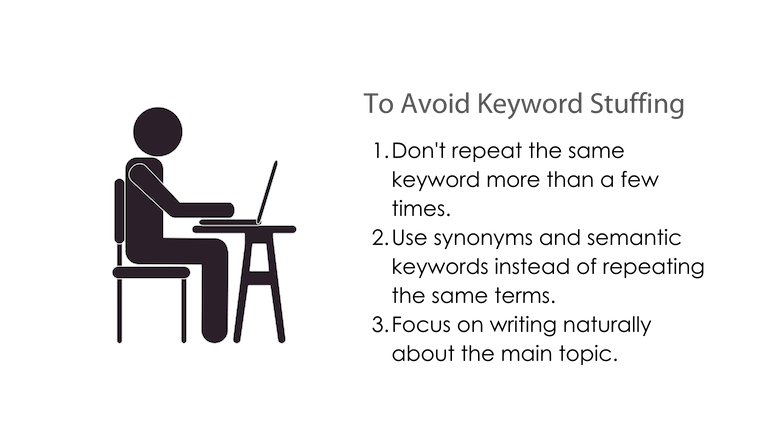
Pro Tip: When you create blog posts and website copy, do what content marketers do. Write naturally about the topic, use synonyms, and semantic keywords instead of repeating the same terms and phrases over and over, and don’t repeat the same keyword more than a few times.
2. You’re Targeting the Wrong Keywords
Another keyword-related problem we see some companies make when creating their own blog content is that they go after the wrong keywords – those for which they will likely have a difficult time ranking or those which won’t convert to sales even if they do manage to rank well.
Going after juicy keywords that get tons of traffic is one of the biggest mistakes made by SEO newbies. And this practice is definitely something that reputable online marketing agencies like BizIQ do not do.
Examples of high search volume terms that are almost impossible to compete with large corporations for include short, popular keywords that target massive industries such as weight loss, credit cards, and acne medications.
You can create a successful keyword strategy to sell products and services in highly-competitive industries, but you will need to target long tail keywords – longer keyword phrases which get less traffic but also have fewer websites competing for them.
For example, instead of targeting “credit cards,” a better choice would be “best credit cards for unemployed college students.”
Another common mistake we often see is local small businesses targeting keywords without any local SEO or regional focus.
For example, don’t target “personal injury attorneys” go after “personal injury attorneys in Phoenix AZ” instead.
While search engines are getting better at tailoring searches to include local results, much non-local, non-converting traffic still gets through and throws off your bounce rate and traffic stats when you don’t target geographically.
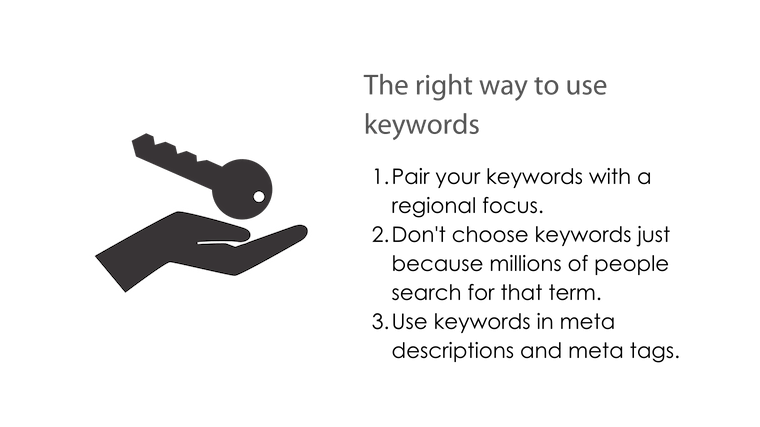
Pro Tip: Pair your keywords with a regional or geofocus and don’t go after keywords just because millions of people search for that term. Also, don’t forget about using your keywords to optimize your meta descriptions and meta tags.
3. You Have Separate Mobile and Desktop Sites
In recent years it was common to have two versions of your website: one domain for desktop viewing (domain-name.com) and a different version for viewing on mobile devices (m.domain-name.com), with emphasis given to the desktop version.
But Google’s shift to mobile-first indexing flips that standard around. Nowadays, you only need one site but designed with all types of devices in mind.
When designing your website, it’s crucial to create a site with responsive design.
That way your site will automatically adjust page layouts and adapt to whatever device your visitor is using – whether desktop, tablet, smartphone or something else – while still giving full access to all of your content.
Google’s latest strategy now relies on indexing the mobile version of your site first and only indexes your desktop version when no mobile version is available.
So, if your desktop site is fully optimized, but your mobile site is a stripped-down version (or under construction), that is a huge problem.
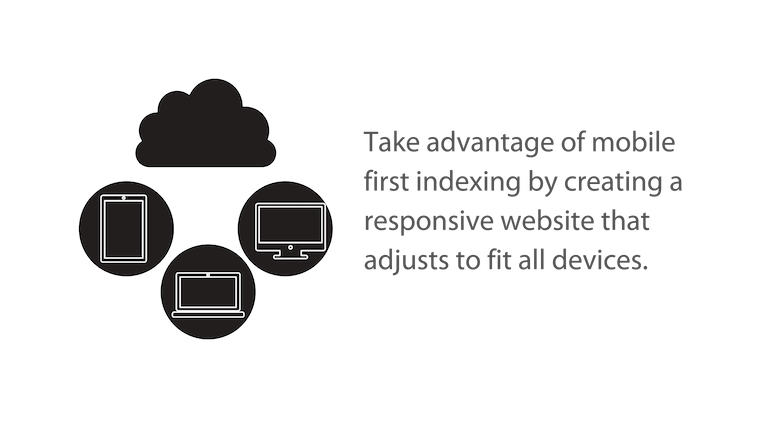
Pro Tip: Ditch the mobile domain and convert the primary/desktop site to responsive design immediately to avoid losing all your hard-earned traffic.
4. Your Commitment to SEO Isn’t Long-Term
Some organizations back off from promoting their sites after achieving good results from their SEO strategies. However, you never want to assume your website will hold on to its rankings forever without ongoing optimization work.
Also, don’t quit because you aren’t getting the results you expect, and you have no idea what went wrong. If you’ve been trying to DIY your keyword research, link building, and everything else, and it’s not working, it might be time to get professional help.
Search engine optimization is a long-term strategy – one which takes time to gain traction and which requires ongoing attention to maintain results.
In other cases, you might decide to pull back or cancel professional digital marketing services due to marketing budget cuts or worries about cost.
If your marketing team or webmaster made SEO optimization mistakes in the past, or your current agency charges too much and delivers too little, understand that professional, quality SEO doesn’t have to break the bank. Not to toot our own horn, but here’s a hint, BizIQ offers affordable Local SEO to fit just about any small business’ budget.
Keep in mind that effective website optimization is cost-effective because, over time, it increases your revenue.
Why? When you invest in SEO, over time, you will see:
- Boosts in website ranking
- Increased online presence
- A rise in site traffic
- More leads
- Higher conversion rate – in other words, more sales!
The SEO boost to organic (free) traffic will turn into leads, and some of those leads will convert into customers. More customers mean more profits and more growth. Everybody wins!
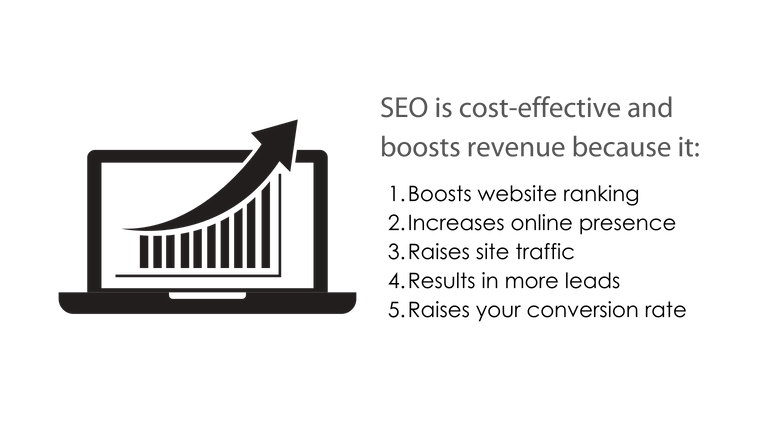
Pro Tip: SEO takes time and involves many moving pieces from keywords to links to analytics and more. Don’t give up. Seek professional help when DIY or bad marketing advice isn’t working.
5. You’re Lacking External and Internal Hyperlinks
Backlinks are another area where some companies make mistakes. And yet, getting this piece wrong means messing up one of the leading ranking factors when it comes to being found in Google search queries.
The main things you need to keep in mind when it comes to building backlinks are authority and relevance.
You must strive to get your links from authoritative sites, especially those in your industry or a related industry.
Ideally, the site linking to you will be relevant to yours. The page and topic of the page that is linking to you should also be related to the content on your site.
And the anchored text used to create the hyperlink will also be relevant to the page on your site that it’s linking to. Do however avoid over-optimized anchor links, as these appear spammy to search engines.
Likewise, internal links should take relevance into account. However, internal links also need to be done in ways that make sense for the visitor. You want them to find the info they’re looking for with as few clicks as possible.
You will also need to organize your site and internal link structure to help pass authority to important pages within your website.
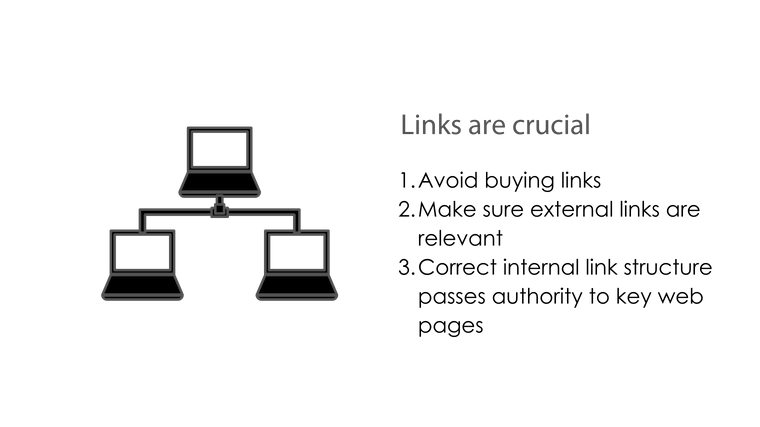
Pro Tip: External links, internal links, and link building are all some of the more advanced aspects of SEO that are easy to get lost in. Avoid buying links and focus on earning external links instead. Because of the complexity of link building, many organizations choose to hire an SEO agency to help them.
Are you a small business owner? Learn even more SEO mistakes committed by small business owners.
Good SEO is always a sound investment
If you want to get results that stick, it’s vitally important that you only implement whitehat SEO strategies and avoid blackhat SEO tactics designed to trick search engines into sending you more traffic.
SEO can be pretty complicated, but by educating your team and keeping up with the best practices for webmasters, and hiring the right online marketing agency you can easily avoid these five SEO mistakes and take your site traffic to the next level.
Have questions about Search Engine Optimization? Drop them in the comments or click on the blue and white chat bubble in the bottom right-hand corner to chat with us right now.
